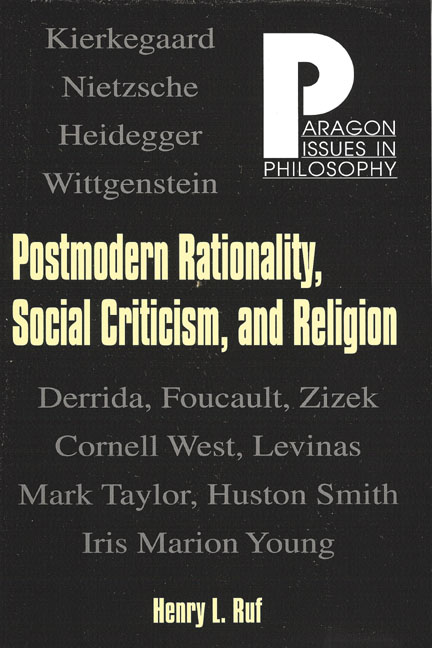Postmodern Rationality (Amazon Kindle)
B&N NOOK book
—Book News
Postmodern Rationality, Social Criticism, and Religion presents a pragmatic, post-modern interpretation of the social nature of all human conceiving, asserting, perceiving, explaining, evaluating and justifying, and of the subjects and objects of all such rationality. It shows that such a social interpretation of human rationality leaves ample room for doing social criticism of social practices and for religious encounters with that which is other than all social rationality. This interpretation and demonstration is communicated to the reader through a series of dialogues with the major philosophical writers and movements of the past 150 years.
The text aims at aiding readers to see that neither pursuing knowledge and justice nor remaining religiously faithful need a/social and a/historical ultimates. The construction of the form and content of the text is driven by an interest in aiding people to move beyond absolutizing human constructs and thus to minimize domination and oppression and to maximize a religious and ethical passion to be free and to act responsibly to all others who remain wholly other. It is to let ways of living and worshiping which are different from one’s own to remain in their otherness even as one enters into respectful dialogue with them.
"Henry Ruf’s book displays impressive scholarship and lucid exposition. The accounts of Rorty, Derrida, and Foucault were particularly valuable to me. This is an important contribution to current social theory that should help to establish religion at the heart of postmodern theory. The book also establishes Ruf as a major philosopher in the intersection of religion and continental social theory." —David Hoy, Distinguished Professor of Philosophy, University of California, Santa Cruz author of Critical Resistance
"This is an excellent, exciting work that performs the invaluable service of situating some of the most important thinkers of the last century and a half in one overarching account of the uses and abuses of 'instrumental rationality' and the consequences for genuine human spirituality and interpersonal relationships. It marks the detailed theoretical payoff on the promise of Religion, Ontotheology, and Deconstruction and on Huston Smith's popular Why Religion Matters." —David Taffel, author of Nietzsche Unbound: The Struggle for Spirit in the Age of Science
"...should be required reading for all philosophy graduate students. Indeed, it should be required reading for graduate students in both the humanities and social sciences. In clear and concise language he explores and explains the differences in approach and perspective of those of the modern school of social analysis and those writers of the post-modern school of social criticism. Ruf's point that there is much to be learned by reading the works of scholars of both schools.... Persons interested in the history of Western intellectual thought will be well served by reading Postmodern Rationality, Social Criticism, and Religion". —Bill E. Lawson, Professor of Philosophy, Michigan State University
"In his impressive new book Postmodern Rationality, Social Criticism and Religion, Henry Ruf gracefully takes up some of the most pressing questions of our age: What is the relation between science and religion? How can we negotiate different religions and cultural belief systems? How can a notion of reason accommodate the differences between peoples and cultures? The breadth and dexterity of Ruf's textual engagements is magnificent. And the clarity of his style and insight make this book not only accessible but also an incredibly important contribution to contemporary knowledge." —Kelly Oliver, Professor of Philosophy, Chancellor's Distinguished Professor, Stony Brook University
"It is the rare philosopher today who can write such a clear and panoramic study of the relevance of pragmatism and postmodernism for today. This wonderful book will engage the general reader and scholar alike with its accessibility and insights born of years of careful reading and thinking." —Roderick M. Stewart, Professor of Philosophy, Austin College
CONTENTSAcknowledgments
Chapter One Introduction
I. Locating Texts in Historical Time
II. Dialogue in a Pluralistic World
III. Ordinary People in Dialogue with Texts by Intellectual “Experts”
IV. Defending a Postmodern Interpretation of Rationality Itself
V. Institutionalized Obstacles to Reading Postmodern Texts Dialogically
Chapter Two The Debate Between Modernism and Postmodernism
I. What Is the Modernism that Postmodernism Opposes?
II. Early Postmodern Criticisms of Modernism
A. Kierkegaard’s and Nietzsche’s Existential Rejections of Metaphysical Explanations
B. Classical Pragmatism’s Rejection of Modernist Theories of Knowledge
III. Modernist Counterattacks with “Sciences of Meaning”
IV. Postmodernist Social and Historical Interpretations of Language
A. Wittgenstein’s Dissolution of Modernist Problems with Meaning
B. Heidegger’s Descriptions of Experiential Meaning
C. Postmodernism as Poststructuralism
V. Derrida’s Deconstruction of Modernist Theories of Signs
VI. Foucault’s Interpretation of Discourse
VII. Neopragmatism’s Challenges to Modernist Theories
Chapter Three Postmodernism’s Passion for Personal Freedom and Beauty
I. Postmodernism’s Appropriation of Earlier Freedom Fighters
II. Kierkegaard as Social/Cultural Critic
III. Nietzsche’s Critique of Social/Cultural Barriers to Free Life
IV. Heidegger on Revolutionizing Decadent Western Culture
V. Foucault’s Ethic of Self-Discipline in the Practice of Freedom
VI. Zizek on Working through Our Cravings for Unity and Enjoyment
Chapter Four Postmodernism’s Resistance to Social Oppression and Domination
I. A Postmodernist Marxist Call for the Democratization of Economic Practices
II. Postmodernist Elements in Habermas’s Search for a Democratizing of Governmental Policymaking
III. Foucault’s Challenge for Local Resistance to the Social Practices Making Domination Possible
IV. American Intellectual Freedom Fighters
A. Alvin Gouldner
B. Iris Marion Young
C. bell hooks
D. Lucius Outlaw and Michael Eric Dyson
E. Cornell West
Chapter Five Postmodernist Interpretations of Faithfulness to Religious Encounters
I. Kierkegaard on Faithful Response to the Invasion of the Nonrational Infinite into the Rational Finite
II. Levinas on the Priority of Ethical Face-to-Face Interpersonal Encounters to Social Practices
III. Zizek on Revolutionary Christianity
IV. A Postmodernist Interpretation of Buddhist and Mystic Traditions
A. Mark Taylor on Sacred Alterity and a Divine Milieu
B. Huston Smith on the God of Mysticism as the Necessary Condition for Everything Finite
V. A Postmodern Fusion of Pragmatic Rationality and Existential Religion: A Wittgensteinian Interpretation of Everyday Religious Discourse
Notes
Bibliography
Glossary
Index






